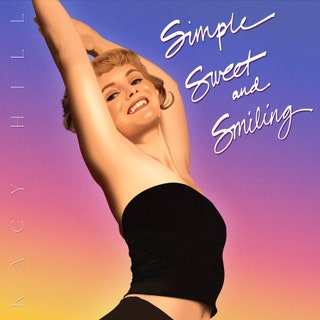The Los Angeles singer-songwriter’s charming third album is full of recurring worries, but her nods to ’80s synth pop and adult contemporary imbue the music with a sense of lightness.
Around the middle of Simple, Sweet, and Smiling, Kacy Hill is wandering outside and staring at the moon. It’s midnight, and the 27-year-old singer has slipped out of a party while her companion remains there, just down the street. She wishes she could have stayed, but she is overwhelmed by anxious fixations: “I just overthink/Can’t shut up,” she sings delicately. It’s a familiar set-up for Hill’s songs, which often motion to her surrounding scenery as she negotiates restlessly with herself. “Six,” from her last album, saw her “high up in a canyon” talking to a stranger, struggling move on from an ex; the title track of Simple, Sweet, and Smiling nods to the city horizon—“a line that fades away/’Til the trees start to blur with the skyline”—as she wrestles over the desire to feel special. Fretting is in Hill’s nature: As she’s joked on Twitter, the two words that best describe her ethos are “ambient stress.”
Simple, Sweet, and Smiling, her charming third album, is full of recurring worries: about being stagnant in your aspirations and inadequate to the people you love, about being forever plagued by dread. At the time that Hill was writing this record, her father survived a heart attack, and her agoraphobic panic disorder returned. Amidst such heaviness, the concept of being “simple, sweet, and smiling,” became an unattainable aspiration: “It was this idea, in my own little world, of not wanting to be this weight in someone else’s life,” she said. As if to be tongue-in-cheek about the fantasy of it all, she appears on the album’s cover as a pin-up girl in front of a sunset backdrop, a tourist’s vision of paradise.
Accompanying this cheesy, blissful image is a more vibrant sound. In the past, Hill has veered toward muted, skeletal R&B; the songs on her last album, Is It Selfish If We Talk About Me Again, didn’t rely on that much more than atmospheric synths, the pitter-patter of a drum machine, and her wispy, light falsetto. Made with the assistance of her boyfriend, Jim-E Stack, along with the composer John Carroll Kirby and, on one song, producer Ariel Rechtshaid, Simple, Sweet, and Smiling delves deeper into Hill’s interest in 1980s synth pop and adult contemporary, maintaining a misty-eyed ease. You can hear this change on the new age-y lead single “Seasons Bloom,” about the sweet, palpable relief of seeing someone you love. It starts off minimal but, as if mimicking the transition from winter to spring, turns plush and buoyant at the chorus.
Songs like “So Loud” and “Easy Going” situate Hill within Carly Rae Jepsen’s zone of windswept pop; she leans toward soul on the piano ballad “Mochi’s Interlude,” and tries more acoustic instrumentation on “Another You.” Some palettes work better than others: While Hill’s voice is pretty, it’s not particularly versatile, and its standard delicacy feels ill-fitted on the funk-inflected “The Right Time.” Meanwhile, she sounds lovely on the rich and churning opening track, “I Couldn’t Wait.” “Oh how the night feels soft,” she sighs over vivid piano, guitar, and saxophone, the elements mingling like watercolors.
Throughout Simple, Sweet, and Smiling are references to the natural world—the morning sun and the sea, the clouds and the moonlight. (You even hear the crackle of thunder on “Caterpillar.”) To many people, the environment represents groundedness and simplicity, the very traits Hill hopes for. And while the album’s songs might reflect her continuous stresses—navigating a lover’s hesitancy, not being as successful as she wants—they still feel unfussy because of her honest and straightforward lyricism. In several songs, she is learning to make her world more still and manageable by asking for what she wants. “One day you’ll look back/And barely recognize that you/You’ve been talking to,” she sings on the closer, ever so reassuring.



0 comments:
Post a Comment